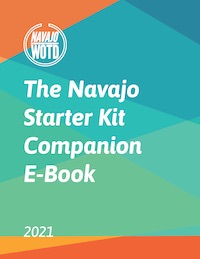yiskáago
tomorrow
yis kah goh
Your Navajo word for today is tomorrow.
“Tomorrow.”
Alternatively, the word can be yiską́o.
Additionally, yiską́ damóo (or yiską́ damį́įgo) is the word for Saturday.
Example: “Yiską́ągo Monument Valleygóó doogááł.” (note: doogááł is the “future” tense of “to go”)
(Here is the “present” tense of “to go”)
